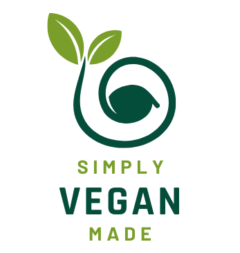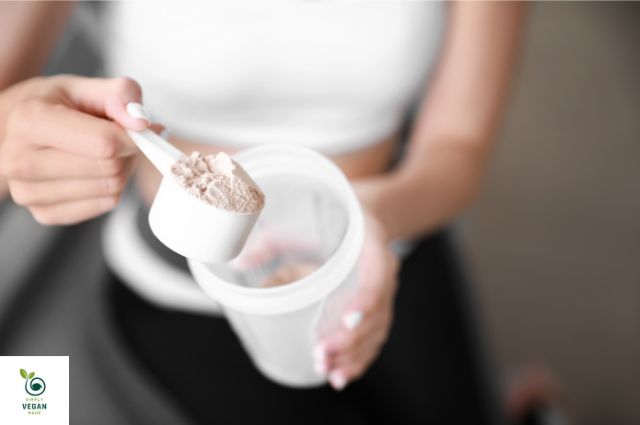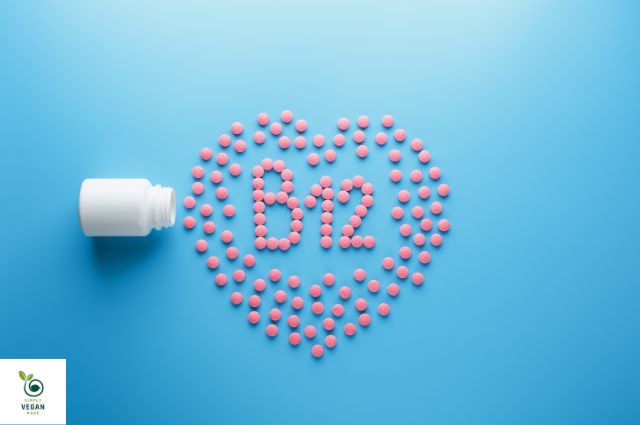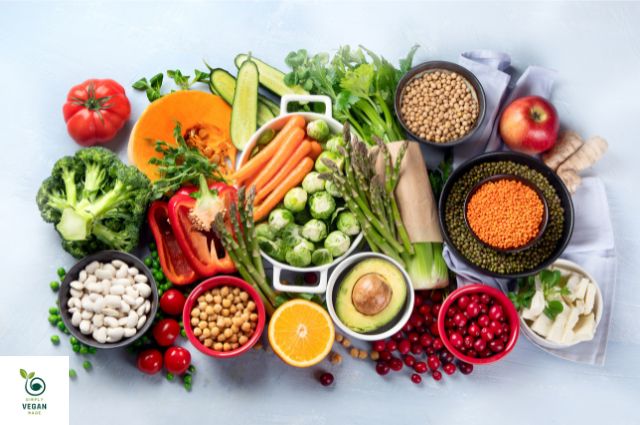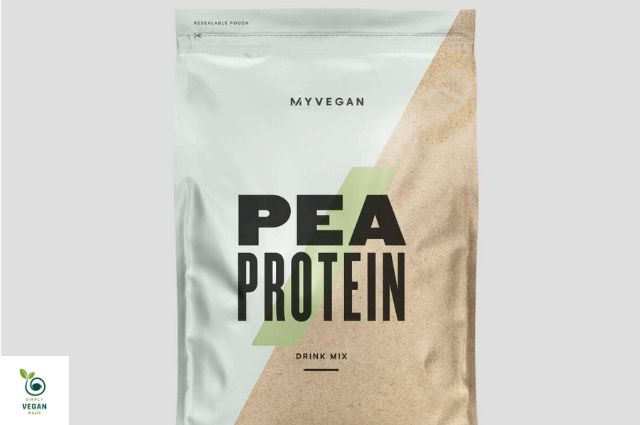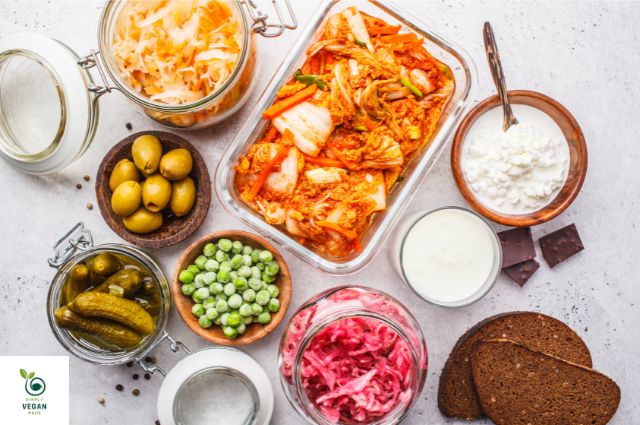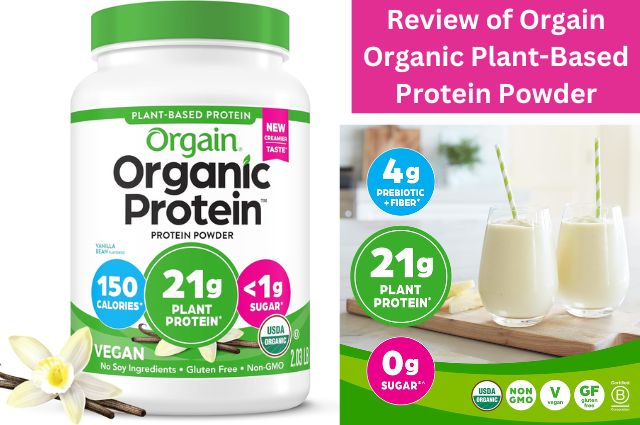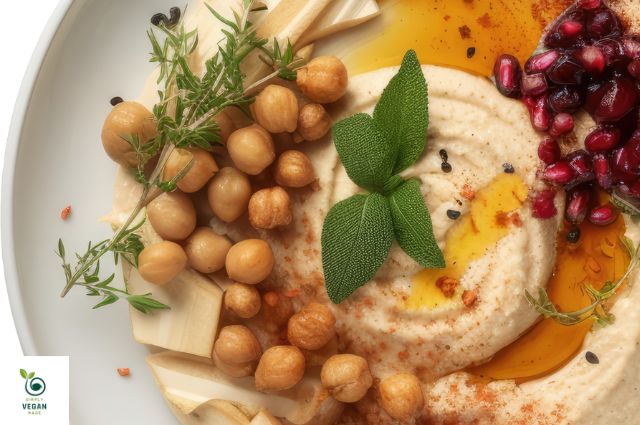This comprehensive guide explores the top contenders in the vegan protein powder market that can effectively support your weight loss goals.
Understanding the Science Behind Vegan Protein and Weight Loss
Before diving into our top picks, it’s crucial to understand why vegan protein powders can be powerful allies in fat loss. Plant-based proteins offer a unique combination of nutrients that boost metabolism, increase satiety, and preserve lean muscle mass during calorie restriction.
Research has consistently shown that high-protein diets, regardless of the protein source, can be effective for fat loss. A 2020 study published in Obesity Science & Practice found that plant-based proteins were just as effective as animal-based proteins in supporting weight loss and improving body composition.
This effectiveness is because of several factors:
Increased Thermic Effect
Protein requires more energy to digest compared to carbohydrates or fats. This means you burn more calories during the digestion process, contributing to overall calorie expenditure.
Enhanced Satiety
Protein-rich foods, including vegan protein powders, help you feel fuller for longer periods. This increased satiety can potentially reduce overall calorie intake, making it easier to maintain a calorie deficit necessary for weight loss.
Muscle Preservation
During weight loss, maintaining muscle mass is crucial for keeping your metabolism high. Plant proteins help preserve muscle while you lose fat, ensuring that the weight you’re losing comes primarily from fat stores rather than lean tissue.
Lower Calorie Density
Many plant-based protein sources are naturally lower in calories than their animal-based counterparts. This lower calorie density makes it easier to maintain a calorie deficit while still consuming adequate protein.
Key Factors in Choosing a Vegan Protein Powder for Weight Loss
When selecting a vegan protein powder to support your weight loss goals, consider the following factors:
Protein Content
Look for powders with at least 20-25 grams of protein per serving. This amount confirms you’re getting a substantial protein boost with each shake or recipe.
Calorie Count
Opt for lower-calorie options, typically under 150 calories per serving. This allows you to add protein to your diet without significantly impacting your overall calorie intake.
Amino Acid Profile
Ensure the powder provides a finish amino acid profile, either through a single source or a blend of complementary proteins. This is crucial for muscle maintenance and overall health.
Fiber Content
Higher fiber content can help with satiety and digestion. Look for powders that contain at least 3-5 grams of fiber per serving.
Added Sugars
Choose powders with minimal or no added sugars. Excess sugar can hinder weight loss efforts and contribute to blood sugar spikes.
Digestibility
Consider powders with added digestive enzymes or probiotics to enhance nutrient absorption and minimize digestive discomfort.
Additional Ingredients
Look for powders with metabolism-boosting ingredients like green tea extract or thermogenic compounds. These can provide an extra edge in your weight loss efforts.
Top 10 Vegan Protein Powders for Weight Loss
Now, let’s explore our top picks for vegan protein powders that can effectively support your weight loss journey, most of these are readily available and I have provided links to Amazon:
1. Orgain Organic Plant-Based Protein Powder
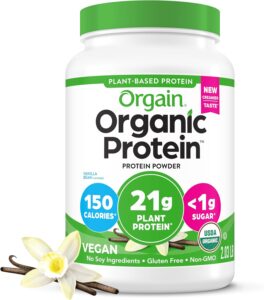
Orgain’s popular option offers a blend of pea, brown rice, and chia seed proteins, providing 21 grams of protein per serving with only 150 calories. It’s organic, low in sugar, and includes fiber for added satiety.
The smooth texture and variety of flavors make it versatile for shakes, smoothies, and baking.
>>>View latest price on Amazon<<<
2. Vega Sport Premium Protein
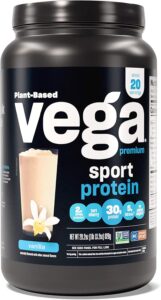
With an impressive 30 grams of protein per serving, this powder combines pea, pumpkin seed, sunflower seed, and alfalfa proteins. It also includes probiotics and tart cherry for recovery support.
The high protein content makes it ideal for people who have higher protein needs or those looking to replace meals.
>>>View the latest price on Amazon<<<
3. Garden of Life Raw Organic Protein
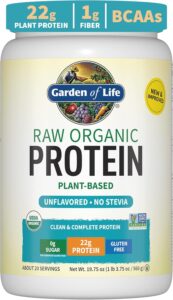
This unique blend features a sprouted protein mix from various sources, offering 22 grams of protein per serving with only 110 calories. It’s organic, raw, and includes probiotics and enzymes for optimal digestion.
The sprouted proteins may be easier to digest for some people.
>>>View the latest price on Amazon<<<
4. Naked Pea Protein
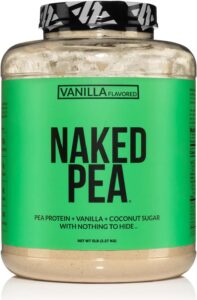
For those who prefer simplicity, this single-ingredient powder provides 27 grams of protein from yellow peas with just 120 calories per serving. It’s unflavored and free from additives, making it versatile for various recipes.
The purity of this product appeals to those looking to avoid any unnecessary ingredients.
>>>View the latest price on Amazon<<<
5. KOS Organic Plant Protein
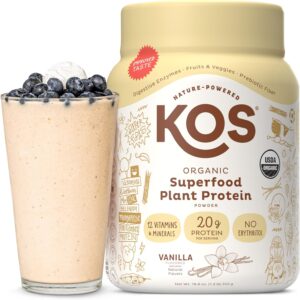
This powder combines pea, flax seed, quinoa, pumpkin seed, and chia seed proteins, offering 20 grams of protein per serving. It includes digestive enzymes and a fruit and vegetable blend for added nutrition.
The diverse protein sources provide a well-rounded amino acid profile.
>>>View the latest price on Amazon<<<
6. Sunwarrior Warrior Blend
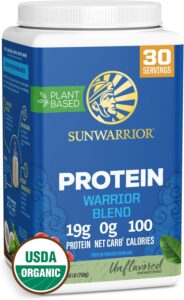
This raw protein powder features a blend of pea, hemp seed, and goji berry proteins, providing 19 grams of protein with only 100 calories per serving. It also includes medium-chain triglycerides (MCTs) for added energy.
The inclusion of MCTs may support ketosis for those following a low-carb diet.
>>>View the latest price on Amazon<<<
7. Nuzest Clean Lean Protein
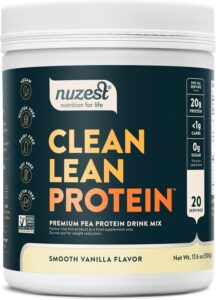
Made from European golden pea protein isolate, this powder offers 21 grams of protein with just 90 calories per serving, boasting one of the highest protein-to-calorie ratios on the market. It’s simplicity and purity make it an excellent choice for people who have sensitive digestive systems.
>>>View the latest price on Amazon<<<
8. PlantFusion Complete Plant Protein
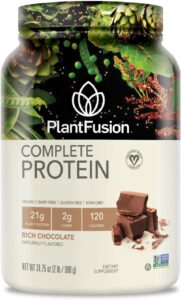
This allergen-free powder combines pea protein isolate with artichoke, amaranth, and quinoa proteins, providing 21 grams of protein per 120-calorie serving. It includes digestive enzymes for improved absorption.
The unique protein blend offers a finish amino acid profile without common allergens.
>>>View the latest price on Amazon<<<
9. Optimum Nutrition Gold Standard 100% Plant
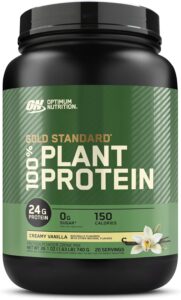
This powder blends pea, brown rice, and sacha inchi proteins, offering 24 grams of protein per 150-calorie serving. It includes ancient grains and pomegranate powder for added antioxidants.
The inclusion of sacha inchi provides omega-3 fatty acids, which are often lacking in vegan diets.
>>>View the latest price on Amazon<<<
10. Aloha Organic Protein Powder
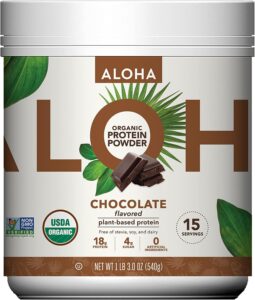
Combining pea, brown rice, hemp seed, and pumpkin seed proteins, this organic powder provides 18 grams of protein per 120-calorie serving. It includes MCTs and prebiotics for gut health support.
The lower protein content makes it suitable for people who have lower protein needs or those using it as a supplement rather than a meal replacement.
>>>View the latest price on Amazon<<<
Innovative Trends in Vegan Protein Powders
The vegan protein powder market is constantly evolving, with exciting innovations emerging:
Fermented Proteins
Some companies now offer fermented vegan protein powders. The fermentation process may improve digestibility and nutrient absorption, making these proteins easier on the stomach and potentially more effective.
Adaptogenic Blends
Protein powders infused with adaptogenic herbs like ashwagandha or rhodiola are gaining popularity. These herbs may help reduce stress and boost metabolism, providing extra benefits beyond just protein supplementation.
Nootropic-Enhanced Formulas
Some brands are incorporating cognitive-enhancing ingredients like lion’s mane mushroom or bacopa. These additions aim to create protein powders that support both body and mind, potentially improving focus and mental clarity alongside physical performance.
Sustainable Packaging
Many companies are moving towards eco-friendly packaging options, such as compostable or recyclable materials. This trend aligns with the environmental consciousness often associated with vegan lifestyles.
Novel Protein Sources
Emerging protein sources like duckweed, microalgae, and even insect-based proteins (for those who consider insects vegan) are being explored. These novel sources often boast impressive nutritional profiles and sustainability credentials.
Implementing Vegan Protein Powders in Your Weight Loss Plan
To maximize the benefits of vegan protein powders for weight loss, consider these strategies:
Meal Replacement
Replace one meal a day with a protein shake to reduce calorie intake while maintaining high protein levels. This can be particularly effective for breakfast or lunch, helping to control calorie intake early in the day.
Post-Workout Recovery
Consume a protein shake after exercise to support muscle recovery and promote satiety. This can help prevent overeating after workouts and support muscle repair and growth.
Snack Alternative
Use protein powder to create healthy snacks like protein balls or bars to curb cravings between meals. These homemade snacks can be tailored to your taste preferences and nutritional needs.
Nutrient Boosting
Add protein powder to smoothies, oatmeal, or baked goods to increase their protein content without significantly increasing calories. This strategy allows you to enhance the nutritional profile of foods you already enjoy.
Combine with Exercise
For optimal results, use vegan protein powder in conjunction with a balanced diet and regular exercise routine. The combination of adequate protein intake and resistance training can significantly enhance body composition changes.
Common Pitfalls and How to Avoid Them
While vegan protein powders can be excellent tools for weight loss, there are some potential pitfalls to be aware of:
Overconsumption
Remember that protein powders are supplements, not meal replacements. Avoid relying too heavily on them and confirm you’re getting a variety of whole foods in your diet. A balanced approach that includes whole plant foods alongside protein supplements is ideal.
Ignoring Other Macronutrients
While protein is important for weight loss, don’t neglect healthy fats and complex carbohydrates, which are essential for overall health and sustained energy. Ensure your diet includes a balance of all macronutrients for optimal health and weight loss results.
Choosing Powders with Added Sugars
Some vegan protein powders contain added sugars for flavor, which can hinder weight loss efforts. Opt for unsweetened versions or those sweetened with stevia or monk fruit. If you prefer sweetness, consider adding your own natural sweeteners in controlled amounts.
Neglecting Whole Food Protein Sources
While convenient, protein powders shouldn’t completely replace whole food protein sources like legumes, nuts, and seeds, which offer extra nutrients and fiber. Aim to get the majority of your protein from whole foods, using powders as a supplement.
Digestive Issues
Some people may experience bloating or gas when first introducing vegan protein powders. Start with small amounts and gradually increase to allow your digestive system to adapt. If issues persist, try different protein sources or talk to a healthcare professional.
Pro Tips for Maximizing Results
Experiment with different brands and flavors to find one you enjoy. Consistency is key for seeing results, so finding a powder you like will make it easier to stick to your plan.
Mix your protein powder with unsweetened plant-based milk or water to keep calories low. This allows you to control the calorie content of your shakes more precisely.
Use a blender to mix your protein shake for a smoother texture and to incorporate extra ingredients like leafy greens or berries. This can turn a simple protein shake into a more nutritionally finish meal.
Time your protein intake strategically, such as immediately after workouts or as a mid-afternoon snack to curb hunger. This can help manage appetite and support muscle recovery.
Track your protein intake along with your overall calorie consumption to confirm you’re hitting your nutritional goals. Many apps and online tools can help with this tracking process.
Exercises to Reinforce Learning
Protein Powder Comparison
Choose three vegan protein powders and compare their nutritional profiles, ingredients, and potential benefits for fat loss. Create a chart or spreadsheet to visualize the differences and help you make an informed decision.
Recipe Development
Create three different recipes using vegan protein powder that fit within your calorie goals for fat loss. Experiment with different flavors and textures to keep your meals interesting and enjoyable.
Weekly Meal Plan
Develop a week-long meal plan incorporating vegan protein powder strategically for fat loss. Include a variety of whole foods alongside your protein supplements to confirm a balanced diet.
Protein Timing Experiment
Try consuming your protein shake at different times of day for a week each (e.g., breakfast, post-workout, before bed) and note any differences in hunger levels or energy. Keep a journal to track your observations and identify the timing that works best for you.
Label Reading Challenge
Next time you’re at a store, compare the labels of five different vegan protein powders and identify which would be best suited for your weight loss goals. Pay attention to protein content, calorie count, and extra ingredients.
Frequently Asked Questions
What is the best vegan protein powder for weight loss?
The best vegan protein powder for weight loss varies depending on individual needs and preferences. However, powders with high protein content, low calories, and minimal added sugars, such as Nuzest Clean Lean Protein or Vega Sport Premium Protein, are often recommended.
How much vegan protein powder should I consume for weight loss?
The amount of vegan protein powder you should consume depends on your overall protein needs and calorie goals. Generally, aiming for 20-30 grams of protein per serving, 1-2 times per day, can be effective for weight loss when combined with a balanced diet and exercise.
Can vegan protein powder help build muscle while losing fat?
Yes, vegan protein powder can help build muscle while losing fat when combined with resistance training and a calorie-controlled diet. Protein supports muscle repair and growth, while a calorie deficit promotes fat loss.
Are there any side effects of using vegan protein powder for weight loss?
Some people may experience digestive issues like bloating or gas when first introducing vegan protein powders. Starting with smaller amounts and gradually increasing can help minimize these effects.
If problems persist, try different protein sources or consult a healthcare professional.
How do I choose a vegan protein powder that’s easy to digest?
Look for vegan protein powders that contain digestive enzymes or probiotics, or opt for fermented protein sources. Single-ingredient powders like pea protein or rice protein may also be easier to digest for some people.
Can I use vegan protein powder as a meal replacement for weight loss?
While vegan protein powder can be used as part of a meal replacement, it’s generally recommended to mix it with other nutrient-dense foods to create a balanced meal. This confirms you’re getting a variety of vitamins, minerals, and fiber alongside the protein.
Does the type of plant protein matter for weight loss?
Different plant proteins have varying amino acid profiles and digestibility. A blend of protein sources often provides a more finish amino acid profile.
However, for weight loss, the most important factors are total protein content and calorie count.
How do I make vegan protein shakes taste better?
To improve the taste of vegan protein shakes, try blending with frozen fruits, adding a tablespoon of nut butter, using plant-based milk instead of water, or incorporating spices like cinnamon or vanilla extract. Experiment with different combinations to find flavors you enjoy.
Is it necessary to use protein powder for vegan weight loss?
While not strictly necessary, protein powder can be a convenient way to increase protein intake on a vegan diet, which can support weight loss efforts. However, it’s possible to meet protein needs through whole food sources alone.
Can vegan protein powder cause weight gain?
Vegan protein powder itself doesn’t cause weight gain. Weight gain occurs when you consume more calories than you burn. However, if you add protein powder to your diet without adjusting other calorie sources, it could contribute to a calorie surplus and potential weight gain.
Key Takeaways
- Vegan protein powders can be effective tools for weight loss when used as part of a balanced, calorie-controlled diet.
- Look for powders with at least 20-25 grams of protein per serving, low calories, and minimal added sugars.
- Consider factors like amino acid profile, fiber content, and extra beneficial ingredients when choosing a powder.
- Implement vegan protein powders strategically in your diet, such as for meal replacements or post-workout recovery.
- Be aware of common pitfalls like overconsumption or neglecting whole food protein sources.
